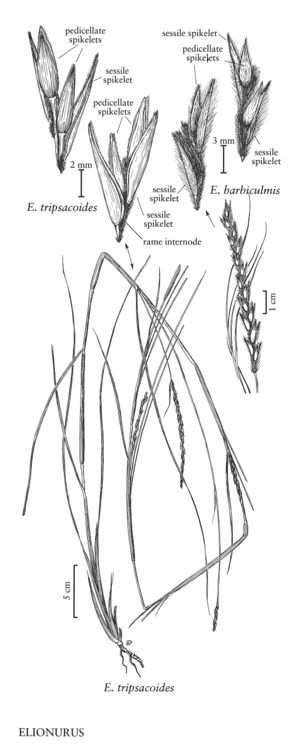Difference between revisions of "Elionurus barbiculmis"
FNA>Volume Importer |
imported>Volume Importer |
||
| Line 43: | Line 43: | ||
|publication year= | |publication year= | ||
|special status= | |special status= | ||
| − | |source xml=https:// | + | |source xml=https://bibilujan@bitbucket.org/aafc-mbb/fna-data-curation.git/src/bb6b7e3a7de7d3b7888a1ad48c7fd8f5c722d8d6/coarse_grained_fna_xml/V25/V25_1638.xml |
|subfamily=Poaceae subfam. Panicoideae | |subfamily=Poaceae subfam. Panicoideae | ||
|tribe=Poaceae tribe Andropogoneae | |tribe=Poaceae tribe Andropogoneae | ||
Revision as of 22:03, 27 May 2020
Plants cespitose. Culms 40-60 cm, erect, usually unbranched, densely antrorsely hirsute beneath the nodes. Sheaths mostly glabrous, often ciliate on the margins, particularly at the throat; ligules with 1-2 mm hairs; blades 15-30 cm long, 1-2(4) mm wide, usually involute, abaxial surfaces with scattered long hairs adjacent to the margins, adaxial surfaces usually densely pilose. Rames 5-10 cm, internodes densely villous. Sessile spikelets 4.5-8 mm; calluses about 0.5 mm, hirsute; lower glumes densely hirsute, acuminate, bifid, teeth 1.5-2.5 mm; pedicels densely pilose dorsally. Pedicellate spikelets with densely pilose lower glumes. 2n = 20.
Distribution
Ariz., N.Mex., Tex.
Discussion
Elionurus barbiculmis grows on mesas, rocky slopes, hills, and in canyons, usually above 1200 m. Its range extends from southern Arizona and southwestern Texas into northern Mexico.
Selected References
None.
